This report provides the main findings from the annual survey of supply teachers in Scotland and highlights the experiences of supply teachers during the 2023/24 academic year
Introduction
The survey
Nature of work
Access to work
Availability of work
Working for a school
Experiences with schools, staff, parents and pupils when undertaking assignments
Provision of key information when undertaking assignments
Access to facilities and amenities in schools when undertaking assignments
Health and safety issues for supply teachers
Financial situation
Training and behaviour management support
Ways in which the Scottish Government could best support supply teachers
Conclusion
Introduction
Supply teachers are integral to the education system. Without supply teachers, many pupils would be denied the opportunity to be taught by qualified and dedicated teachers who ensure that schools can continue to provide the education to which children and young people are entitled.
Supply teachers make a vital contribution to securing high educational standards for all children and young people.
NASUWT’s annual survey of supply teachers in Scotland aims to examine the changing experiences of supply teachers, including issues and trends.
The 2023/24 survey was undertaken between June and August.
The survey
Nature of work
Supply teachers were asked why they carried out supply teaching work. The top five reasons cited by supply teachers were:

-
42% stated that they were undertaking ad hoc supply work whilst seeking a permanent position;
-
39% stated that they wanted greater flexibility over the work they do;
-
4% stated that they want more freedom and autonomy;
-
4% stated that they were concerned about the workload in schools; and
- 4% stated that they felt demoralised in their previous job.
Forced onto supply list due to lack of jobs.
When asked what other advantages/disadvantages were associated with being a supply teacher, over half of supply teachers (53%) cited the freedom to move on if they did not enjoy a school, just over one in ten (12%) cited lack of job security/support, another 12% cited no planning, a further 12% cited no marking, and just over one in 20 (6%) cited the lack of collegiality.
Supply teachers were asked about the ability to secure work teaching during the academic year 2023/24. Just two fifths (41%) reported that they had no problems securing work, whereas a third (33%) reported that they had some problems securing work. However, a fifth of supply teachers (20%) reported that they had significant problems getting supply work and just over one in 20 reported that they had not been able to secure any supply work.
South Lanarkshire have only offered me two days’ supply work throughout the whole year. I had to get alternative full time employment to support my family.
Access to work
During the academic year 2023/24, over three quarters of supply teachers (78%) reported that they were working for one local authority, 17% reported that they were working for two local authorities and 4% reported that they were working for three local authorities.
When asked if this was more or less than the number of local authorities they had worked for during the previous academic year, just under one in 20 supply teachers (4%) stated that it was more, just under one in ten (9%) stated that it was less, and just under nine out of ten (87%) stated that it had stayed the same.
Twenty-nine per cent of supply teachers believed that the use of online booking platforms, such as Teacher Booker, by some Scottish Councils had a detrimental impact on their ability to secure work.
It allows schools to pick their cover, rather than previously it be allocated by HR and the same people get all the work.
Literally scrabbling around for work. It is so demeaning that the first one to click the button gets the work.
Teacher Booker can easily be manipulated to accept any job. For example, someone beat me to a position by 0.9 seconds and I was standing next to the Business Manager as they clicked the button to send it. Also, the system makes it difficult to accept jobs while we are working.
Thirty per cent of supply teachers reported travelling between 0-10 miles for an assignment, just over a third (34%) reported travelling between 11-20 miles, just under one in ten (9%) reported travelling between 21-30 miles, another 9% reported travelling between 31-40 miles for an assignment, just over one in 20 (7%) reported travelling between 41-50 miles, and just under one in ten (9%) reported travelling between 51-60 miles. Two per cent of supply teachers reported travelling over 100 miles to undertake an assignment during the academic year 2023/24.
Just over a fifth of supply teachers (22%) reported that they had to travel further than in previous years in order to secure work.
Well in excess of half of supply teachers (55%) stated that the cost of living crisis had a detrimental impact on how far they were willing to travel to undertake an assignment.
Availability of work
Supply teachers were asked where they were able to obtain work during the academic year 2023/24.
Two fifths of supply teachers (40%) who responded to the survey stated that they were able to secure work in primary schools, well in excess of half (57%) stated that they were able to secure work in secondary schools, and one in ten (10%) reported that they were able to secure work in special schools/pupil referral units.
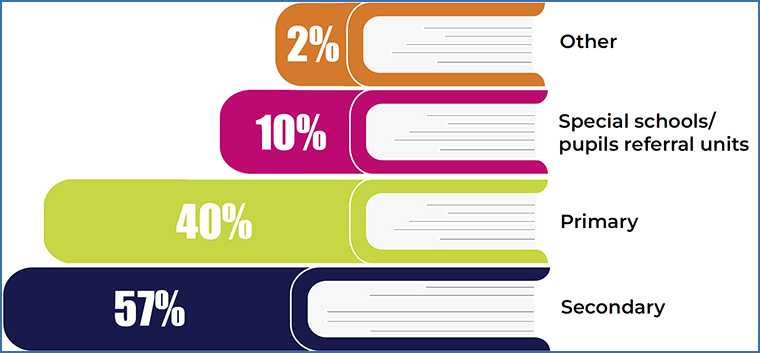
Where supply teachers undertook the majority of their work during the academic year 2023/24
For those supply teachers who reported that they were able to secure work during the academic year 2023/24, just over a fifth (22%) reported that the majority of their supply teaching was short term supply (e.g. ad hoc for two days or fewer) and over well in excess of three quarters (78%) stated that the majority of their supply teaching was on longer term assignments (e.g. placements in excess of two days).
Of those supply teachers on a long term assignment, a quarter (25%) said that this was weekly supply work and 14% stated that this was monthly supply work. Just under a third of supply teachers (30%) reported that the majority of their work was termly supply work and 31% stated that the majority of their supply teaching was on longer term assignments in excess of a term.
When supply teachers were asked how many days on average they were able to obtain work during the academic year 2023/24, 14% said they secured work one day a week, over a fifth (23%) two days a week and 14% three days a week. Just over one in ten supply teachers (12%) said they were able to secure work for four days a week and well in excess of a third (37%) stated that they were able to secure work five days a week.
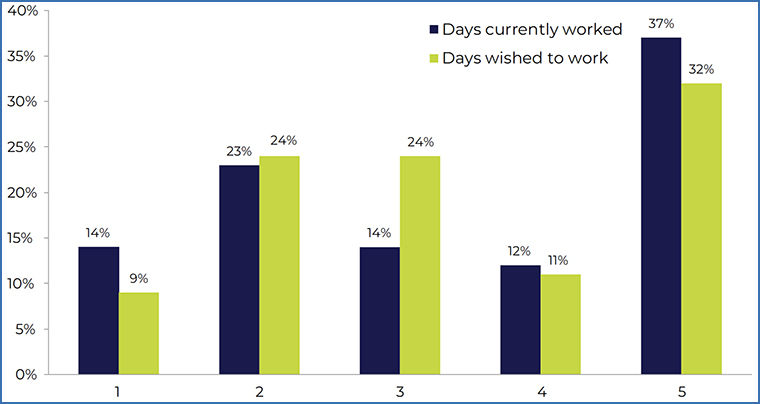
Whilst the work I am getting is sustained periods of time, the gaps between the work requiring alternative income streams have increased.
However, over two fifths (43%) said that they would like to work either four or five days a week.
Just over two fifths of supply teachers (41%) stated that the amount of supply work had decreased during 2023/24 when compared to the previous academic year, whereas just over one in 20 (7%) stated that the amount of supply work had increased. Just over half of respondents (52%) stated that the amount of supply work they were able to secure had stayed the same.
Working for a school
Supply teachers were asked about their experiences working for a school during the academic year 2023/24.
Experiences with schools, staff, parents and pupils when undertaking assignments
Just under three fifths of supply teachers (59%) reported that they are always made to feel welcome by the school and over a quarter (28%) reported that they are often made to feel welcome by the school. However, one in ten supply teachers (9%) reported that they are rarely made to feel welcome by the school and 3% stated that they are never made to feel welcome by the school.
When asked how welcome they are made to feel by the teaching staff in schools, well over two fifths of supply teachers (46%) reported that they are always made to feel welcome and just over two fifths (42%) reported that they are often made to feel welcome by the teaching staff in schools. However, over one in ten (12%) reported that they are rarely made to feel welcome by the teaching staff in schools.
When asked how welcome they are made to feel by the support assistants in schools, a third of supply teachers (33%) reported that they are always made to feel welcome and well over half (56%) reported that they are often made to feel welcome by the support assistants in schools. However, just over one in ten (11%) reported that they are rarely made to feel welcome by the support assistants in schools.
When asked how welcome they are made to feel by the administrative staff in schools, a third of supply teachers (33%) reported that they are always made to feel welcome and half (50%) reported that they are often made to feel welcome by the administrative staff in schools. However, 17% reported that they are never made to feel welcome by the administrative staff in schools.
When asked how welcome they are made to feel by the pupils in schools, just 12% of supply teachers reported that they are always made to feel welcome and just under two fifths (38%) reported that they are often made to feel welcome by the pupils in schools. However, well in excess of two fifths of supply teachers (44%) reported that they are rarely made to feel welcome by the pupils and just over one in 20 (6%) stated that they are never made to feel welcome by the pupils.
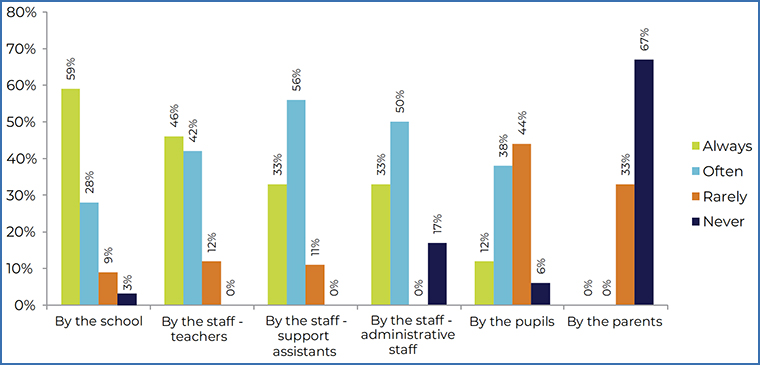
In respect of being made to feel welcome by the parents, a third of supply teachers (33%) stated that they are rarely made to feel welcome, whereas just over two thirds (67%) stated that they are never made to feel welcome by the parents.
Provision of key information when undertaking assignments
Of those supply teachers able to secure work during the 2023/24 academic year, just over two thirds (68%) stated that they were not given the school’s overall risk assessment and 11% stated that they were not sure.
Two thirds of supply teachers (66%) stated that they were not given the arrangements in place for supply teachers to report safely to the workplace and just under three quarters (74%) stated that they were not given the details of any procedures and protective measures in regards to Covid-19, including any financial support available.
Anytime I have not been shown a list of pupil information for pupils with special needs, allergies or behavioural plans, I have asked for them.
Over half of supply teachers (53%) stated that they were not provided with the details regarding access to and availability of hand sanitiser and 47% of supply teachers reported that they were not provided with the details in place to ensure classrooms and work areas were well ventilated.
In excess of a third (37%) stated that they were not provided with the details of any designated contact(s) for any questions, problems or emergencies and just over a quarter of supply teachers (26%) reported that they were not given the details of who and where to report to each day, including details of the signing in process.
Well over half of supply teachers (55%) reported that they were not provided with the details of how to raise any concerns about health and safety and just under two fifths (39%) reported that they were not provided with the details of how to call for assistance, including first aid. Furthermore, just under three fifths of supply teachers (58%) reported that they were not provided with the details of the nearest first aid room or appropriate area.
In regards to the school’s fire evacuation plans, including routes and procedures, well over two fifths of supply teachers (45%) reported that this was not provided to them when undertaking assignments in schools during the 2023/24 academic year.
Well over two fifths of respondents (45%) stated that they had not been given a tour of the school site, including identifying where they would be teaching when undertaking assignments in schools.
In respect to the timetable, including breaks and lunch periods, as well as expectations on staff during such times, just over a fifth of supply teachers (22%) reported that information regarding this had not been provided to them when undertaking assignments in schools.
Thirty per cent of respondents reported that they had not been provided with the details of the registration process and expectations for the appropriate movement of pupils around the school site between lessons, at breaks, at lunchtimes and at the end of the school day when undertaking assignments during the 2023/24 academic year.
In regards to teaching, over half of supply teachers (53%) reported that they were not provided with details of how to access relevant information on schemes of work for the subjects they were expected to teach and well over two fifths (46%) reported that they had not been provided with access to relevant teaching materials. In addition, well over a third of supply teachers (37%) stated that they were not provided with the details regarding access to computers, with login details and what to do at the end of the school day and just under three fifths (58%) reported that they were not provided with the details of any resources they might reasonably be expected to provide to students, such as pens.
Over half of respondents (53%) stated that they were not provided with a list of the pupils in the class(es) they would be teaching, including details of any additional information, such as those with medical conditions or additional support needs (ASN) and over three fifths of supply teachers (63%) stated that they had not been provided with the details of any pupils known to be potentially violent and how this should be managed. Furthermore, over two fifths of supply teachers (43%) reported that they had not been provided with the behaviour management policy when undertaking assignments in schools, including who to contact.
Over two fifths of supply teachers (43%) reported that they had not been provided with the details of any events, meetings or specific activities taking place and well over half (57%) stated that they had not been provided with the arrangements for school transport, as appropriate, when undertaking assignments during the 2023/24 academic year.
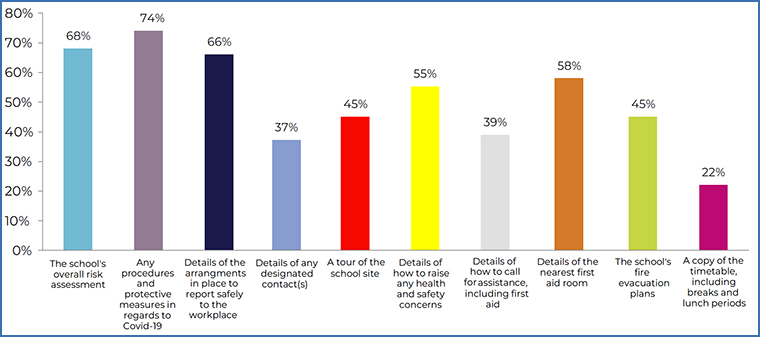
Examples of the key information supply teachers were denied access to during the academic year 2023/24
Access to facilities and amenities in schools when undertaking assignments
When asked about their most recent assignment, just over a fifth of supply teachers (21%) stated that they do not always have access to staff rooms where they are available, just under two fifths (39%) stated that they do not always have access to staff food and drink facilities, and just 3% said that they do not always have access to toilet/washroom facilities. Twenty-nine per cent reported that they do not always have access to car parking.
Just under two fifths of respondents (39%) stated that they do not always have access to staff food and drink facilities when undertaking assignments
Health and safety issues for supply teachers
Just under two fifths of supply teachers (39%) who secured work during the academic year 2023/24 stated that they were concerned about their health and safety when undertaking supply work in schools and 8% thought that they may have been penalised or had work cancelled for disclosing personal information about their health and safety (e.g. pregnant).
At one school, I feared for my physical safety. I had violent boys in a P5/6 class who had explosive tempers, would verbally swear at me and start to punch and kick.
I think I had a long term supply contract cancelled because I disclosed I was neurodivergent. Before that, they told me the job was mine.
Financial situation
Supply teachers were asked about their financial situation during the academic year 2023/24.
Just over a quarter (27%) reported that they had sourced work elsewhere other than teaching during the academic year. Of those, just over three quarters (77%) stated that the work sourced elsewhere other than teaching failed to provide the same level of financial income that they would have obtained had they been able to obtain work teaching.
Just over a quarter of supply teachers (27%) reported having to claim some form of state benefit during the academic year (e.g. Universal Credit) and almost half of respondents (49%) stated that they had experienced financial hardship as a supply teacher over the same period.
I borrow from family.
I cannot apply for a mortgage and cannot have a holiday in the summer because I am unemployed and not paid over the summer. I will struggle to pay all my bills, rent and food.
Due to spasmodic nature work, I am living in my parents’ spare room after 20 years, which curtails my options in many regards. I’m claiming Universal Credit and my credit score has tanked. All of these crush any of the significant life decisions I would otherwise take.
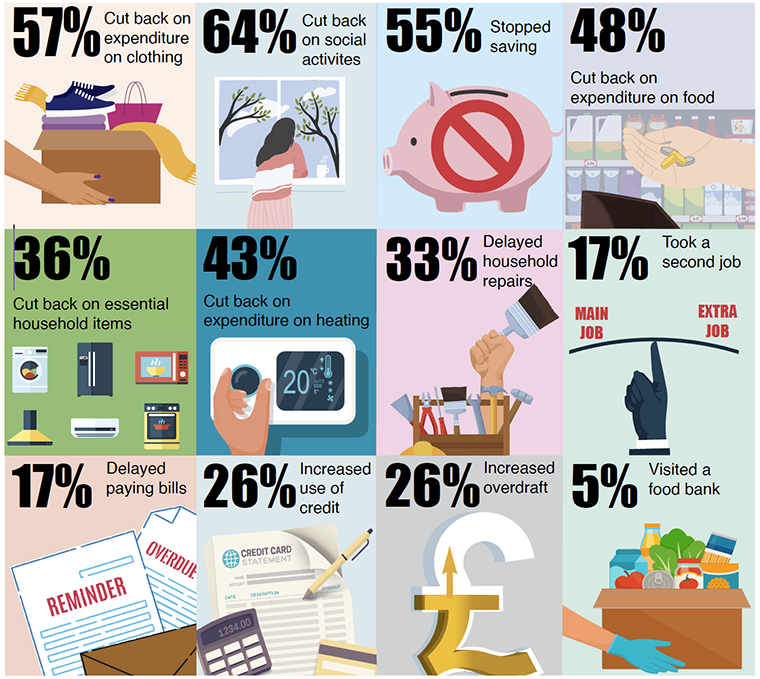
Almost half of respondents (49%) stated that they had experienced financial hardship as a supply teacher
Eighty-one per cent of supply teachers who responded stated that undertaking supply work and the inability to secure a permanent post, had affected their ability to make significant life decisions
Training and behaviour management support
Well over half of supply teachers (56%) stated that they had not been given access to career long professional learning (CLPL) in the last 12 months.
For those supply teachers who accessed CLPL, just under a quarter (24%) stated that this had been provided by local authorities, over a third (35%) stated that this had been provided by schools, 14% stated that this had been provided by their trade union, 3% stated that this had been provided by a subject specialist organisation, and just under two thirds (65%) reported that it had been self directed CLPL.
Sixty-nine per cent of supply teachers stated that they had not been provided with an annual Professional Review and Development (PRD) meeting
Of those supply teachers eligible to complete their professional update in the academic year 2023/24, just over half (52%) were successful, whereas just under a quarter (24%) of those who were eligible reported that they were successful, although there were difficulties in getting their professional update signed off. Just under a quarter of eligible supply teachers (24%) reported that they were unsuccessful and there were difficulties in the process.
Assignment cut short when a teacher returned early. My experience is that schools do not freely get involved with CPD of supply teachers.
In regards to participating in in service training (INSET) days provided by schools during the 2023/24 academic year, just under a third of supply teachers (32%) reported that they were asked to participate in INSET days in all the schools where they undertook assignments, whereas 13% reported that a few of the schools asked them to participate in INSET days, and well over half (55%) reported that they were not asked to participate in any INSET provided by the schools where they undertook assignments in.
Well over a third of supply teachers (37%) reported that they do not feel they are treated with respect and dignity
In most schools, staff rarely talk to supply teachers.
I don’t think supply teachers are treated with the respect we deserve. Lack of jobs, council trying to break our service, PRD geared towards permanent teachers, being put into classes with no information about any of the pupils we teach (i.e. ASD or behaviour issues). Other teachers’ attitudes at times are derogatory and they look down on supply teachers.
Ways in which the Scottish Government could best support supply teachers
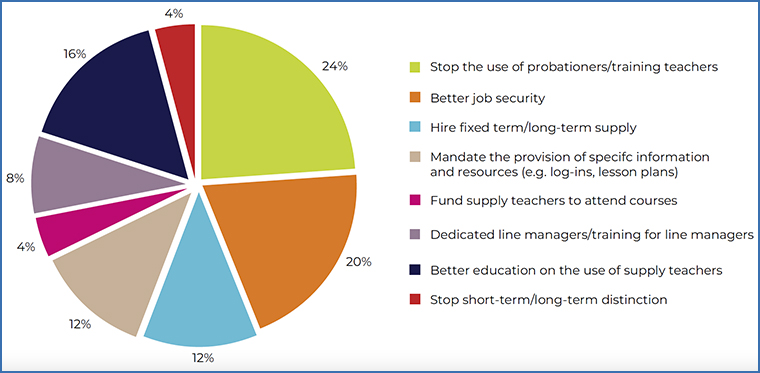
The current situation for supply teachers is shocking. We were led to believe by the Government that there was a shortage of teachers; spent years retraining to then be kicked to the kerb after probation with zero job prospects.
It has really impacted my mental health and I am thinking about leaving my career.
I won the teaching student of the year two years ago and now can’t even get a day’s supply. It is horrendous. I had no idea getting into teaching would only lead to unemployment and benefits. If I’d have known this, I NEVER would have entered the profession.
Just under three fifths of supply teachers (58%) who responded stated that, based on their experiences during the 2023/24 academic year, they were currently looking for work outside of teaching
Conclusion
The survey of supply teachers emphasises the crucial role that supply teachers have played in schools in Scotland during the 2023/24 academic year.
However, the survey suggests that the experiences of supply teachers throughout, the 2023/24 academic year have been varied. For some supply teachers, the opportunities for work has increased, whereas others have found that they have been forced to travel further in order to secure work, despite the ongoing cost of living crisis.
Given the vagaries of intermittent and insecure employment, a number of supply teachers have had to make tough decisions about their expenditure, including cutting back on their expenditure on essential items, such as food and heating. Some supply teachers have even been forced into mortgage/ rent arrears, as well as rely on food banks.
In addition, some supply teachers have been forced to claim Universal Credit and there are those who have had to rely on the generosity of family and friends to make ends meet.
Furthermore, the 2023/24 survey indicates that there has been an increase on the number of supply teachers reporting that schools are routinely failing to provide key information when undertaking assignments, including in regards to the pupils they are expected to teach, as well as critical health and safety information to enable them to safely discharge their duties.
There are concerns that these disparities in treatment are impacting disproportionately on women, Black and minority ethnic (BME) groups and disabled teachers, who are more likely to be employed as supply teachers.
In this context, the results from the 2023/24 survey substantiate the pressing need for a better deal for supply teachers which recognises and values the important and significant contribution that they make to the Scottish education system.
The full survey report can be downloaded on the right/below.
